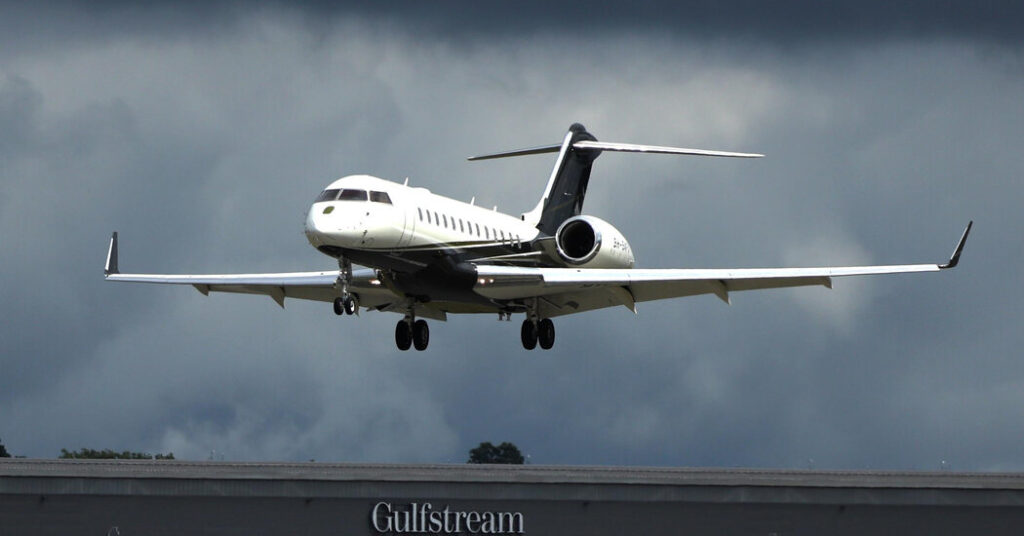It could eventually be the world’s first wealth tax.
A handful of countries are taking baby steps to impose a fee on private jets and first- and business-class seats on flights taking off from their airports. The proceeds would help all the countries that join the coalition adapt to climate change.
“Those who pollute more should contribute more, and a levy on premium fliers can generate billions for climate resilience, adaptation and sustainable development,” said Maria del Mar Fernández-Palacios, a Spanish diplomat. She was representing her country at an event at the COP30 climate talks to draw other countries to join the Premium Flyers Solidarity Coalition, as they call themselves.
They’re a long way from raising billions, though.
Spain is among only two industrialized countries, along with France, that support this effort. The majority are countries from where few premium flights depart but that stand to gain from the potential proceeds: Benin, Djibouti, Kenya, Nigeria, Sierra Leone, Somalia and South Sudan. Four countries have joined the coalition as observers,: Antigua and Barbuda, Brazil, Fiji and Vanuatu.
Aviation accounts for around 4 percent of the greenhouse gas emissions that are raising global temperatures to dangerous levels, with private jets and first-class seats standing out for a disproportionate share of pollution per passenger.
In a statement, the International Air Transport Association, a global trade group, called the proposed tax “exasperating and disappointing.”
The association said the industry had already pledged to reduce its climate pollution in other ways. That includes efforts to make planes more fuel-efficient, using biofuels and offsetting the emissions of air travel with carbon credits, which have been criticized as ineffective. The European Commission’s consumer protection authority has called the advertising claims for the offsets “misleading.”
Countries currently have a range of existing taxes on aviation. Some tax all flights equally. The 27-country European Union imposes an additional tax on private jets. Maldives has a staggered system of taxes, with private jet passengers paying nearly 10 times what economy class passengers pay. France imposes different fees based on both the class and the distance of the flight: On a per passenger basis, a first-class seat on a short-haul flight is taxed at a higher rate than an economy seat on a long haul. Very few countries use the proceeds from aviation taxes for climate measures.
The would-be premium passenger tax aims to change that.
The terms are still vague. The structure of such a tax could vary by country, depending on how they currently tax aviation. When it takes effect depends on the national governments that join the effort. And it remains to be seen whether countries with the busiest airports, including the United States, the United Arab Emirates and Britain, will agree to join this voluntary coalition.
Still, it’s notable because it is potentially a source of new money at a time when there is very little new money to help countries cope with the hazards of a hotter planet. Rich countries promised to raise $40 billion a year for lower income countries for climate adaptation measures, per year. They barely raised $26 billion.
What’s especially attractive to low and middle-income countries is that the proposed tax is designed to raise cash rather than extend loans. Many of these countries are already drowning in debt. They are wary of taking on new debt to pay for climate adaptation measures.
“It’s very simple. We need new resources that don’t create debt, that are predictable and that have some rationality for sectors that pollute,” Laurence Tubiana, a French diplomat who has led the negotiations for the proposed tax, said in a recent interview. “It will be difficult. There will be resistance. ”
This strategy to build a voluntary coalition reflects an effort to bypass conventional international agreements under United Nations rules that require global consensus or a majority of countries to vote in favor of a given measure. In reality, many times, those sorts of international agreements collapse in negotiation.
The latest example of that was a long-awaited vote on a carbon tax on the shipping industry at the International Maritime Organization, a U.N. agency. The United States led a vociferous attack on it, threatening visa restrictions and other sanctions against countries that backed it. The proposed measure was deferred by a year.
The proposed new jet tax comes after years of deliberations among policymakers and national leaders to figure out new ways of raising money. At the international climate talks two years ago, in Dubai, United Arab Emirates, a task force was formed by the leaders of Barbados, France and Kenya. In June of this year, eight governments backed the idea of a tax on private jets, along with first-class and business flights. Since then, Barbados backed out. Djibouti, Nigeria and South Sudan joined.
Demand for high-end travel has surged over the last five years in the United States. Two of the biggest U.S.-based airlines, Delta and United, have seen revenue from premium flights increase so handsomely that they could soon rival revenue from economy seats.
Niraj Chokshi contributed reporting.
Somini Sengupta is the international climate reporter on the Times climate team.
The post There’s a New Effort on the Runway to Raise Climate Funds appeared first on New York Times.




